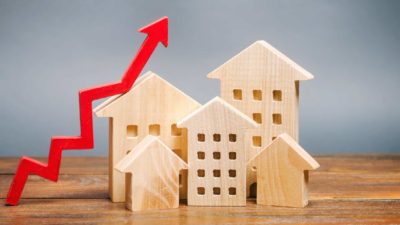Household wealth from direct investment in shares has reached a record high of $1.4 trillion.
This record comes amid reports of landlords selling their properties at the highest rate in five years.
We investigate.
Shares vs property: What are the trends?
Household wealth through the direct ownership of shares and other equity increased by 3.8% or $51.8 billion in the December quarter, according to figures released by the Australian Bureau of Statistics (ABS).
That's the fastest pace of growth since the December 2020 quarter. Back then, the ASX 200 was in the midst of a strong recovery from the COVID-19 market crash in February.
According to reporting in the Weekend Australian, young investors are turning to shares vs. property due to the affordability of this investment option.
And many are diversifying beyond the ASX to US shares.
The average age of investors using the online trading app Pearler to buy shares is 35 years. Recent data shows users' exposure to US shares has increased by 138% over the past two years.
What's the appeal of US shares?
US shares have certainly outperformed ASX 200 shares recently, with the S&P 500 Index (SP: .INX) up 15.3% compared to the S&P/ASX 200 Index (ASX: XJO) up just 1.27% since April 2022.
Pearl co-founder Nick Nicolaides said:
Investors these days are not tied to the same 20 or 30 stocks on the ASX.
And for younger Australians, their wealth in 20 or 30 years is going to be driven far more by capital growth than dividends, so net net it's a positive thing that this generation is getting more exposure to international markets.
Most of Pearlers users access US shares via exchange-traded funds (ETFs).
We recently took a look at which ASX ETFs give Aussie investors access to US stocks.
The best performer among the ETFs we profiled was the BetaShares NASDAQ 100 ETF (ASX: NDQ), up 45% over the past year.
The US is also home to the Magnificent Seven stocks, which include NVIDIA, Microsoft, Amazon, and Meta Platforms, and also at the forefront of one of today's biggest investment trends, AI.
Fool analyst Chris Copley said significant price gains and earnings growth among these seven stocks were a key reason why US shares did better than ASX 200 shares last year.
Why are landlords selling?
The ABS household wealth figures showed a 1.77% increase in the value of residential land and homes directly owned by Australians. The value rose by $188.5 billion to $10.66 trillion.
Property was the largest contributor to the quarterly growth rate of overall household wealth.
As we reported recently, shares vs. property delivered very similar returns over the past century at about 11% per annum.
Although more young investors may be turning to shares vs. property, Australians overall are still very interested in real estate investment as a means of wealth generation.
The latest ABS lending finance figures showed a 21.5% year-over-year surge in real estate investment lending compared to a 9.9% bump for owner-occupier purchases.
Agents are seeing more investors in the market due to skyrocketing rents and impressive capital gains.
However, The Australian reports PropTrack research for the March quarter shows a larger number of landlords are selling their real estate investments than usual, particularly in Sydney and Melbourne.
3 in 10 sales are ex-rental properties
Three in 10 homes sold on property portal realestate.com.au, owned by REA Group Ltd (ASX: REA) in the March quarter were ex-rentals, a near doubling of pre-pandemic levels.
About 36% of recent sales in Sydney and Melbourne were investment properties compared to 34.9% in Perth and 33% in Brisbane.
Industry experts say some landlords are getting out due to increased state taxes, higher interest rates and inflationary pressure on holding costs such as insurance.
Others say some landlords are simply cashing in on high-performing investments after long periods of ownership.
For example, Perth and Brisbane are among the best-performing markets today. House prices are up 20% and 15.9%, respectively, over the past 12 months.
These cities have the third and fourth highest rate of ex-rental sales, according to PropTrack.
ATO statistics also show Australians above the age of 60 represent the largest cohort of landlords.
It is inevitable that as more baby boomers age, some will sell their real estate investments for their retirement.
We looked at whether you'd make more money in dividends than rent if you sold your investment property, as well as whether ASX property shares are a good alternative to bricks and mortar.









